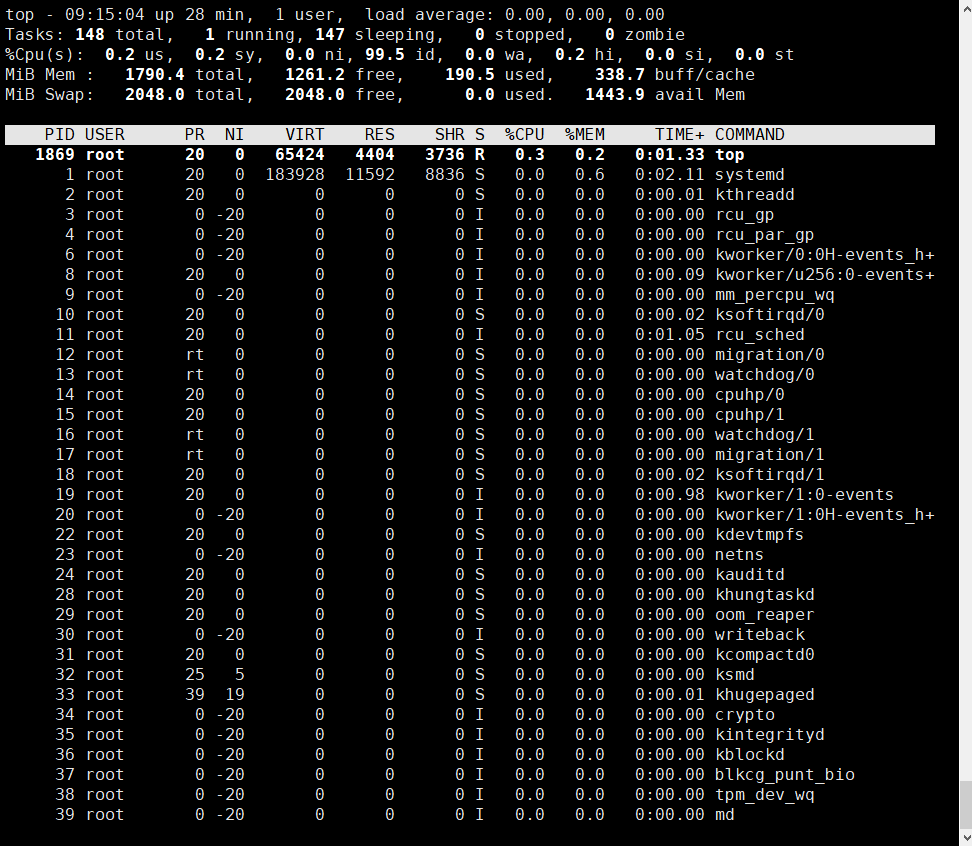shell脚本进阶和进程和计划任务
一、编写脚本实现登陆远程主机。(使用expect和shell脚本两种形式)。
1.编写expect脚本
#!/usr/bin/expect
spawn ssh 10.0.0.7
expect {
"yes/no" { send "yes\n";exp_continue }
"password" { send "hs326vzx018\n" }
}
interact
查询执行结果
[root@centos8 ~]# ./expect.sh spawn ssh 10.0.0.7 root@10.0.0.7's password: Last login: Sat Feb 12 22:24:22 2022 from 10.0.0.8 [root@localhost ~]#
2.编写shell脚本
[root@centos8 ~]# cat shell.sh #!/bin/bash PASSWORD="hs326vzx018" sshpass -p "$PASSWORD" ssh root@10.0.0.7
查询执行结果
[root@centos8 ~]# ./shell.sh Last login: Sat Feb 12 22:31:11 2022 from 10.0.0.8 [root@localhost ~]#
二、生成10个随机数保存于数组中,并找出其最大值和最小值
[root@centos8 ~]# vim max_min.sh
[root@centos8 ~]# cat max_min.sh
#!/bin/bash
declare -i min max
declare -a nums
for ((i=0;i<10;i++));do
nums[$i]=$RANDOM
[ $i -eq 0 ] && min=${nums[0]} && max=${nums[0]} && continue
[ ${nums[$i]} -gt $max ] && max=${nums[$i]} && continue
[ ${nums[$i]} -lt $min ] && min=${nums[$i]}
done
echo "All numbers are ${nums[*]}"
echo Max is $max
echo Min is $min
[root@centos8 ~]# chmod +x max_min.sh
[root@centos8 ~]# ./max_min.sh
All numbers are 15637 15206 20536 17906 6160 31838 510 27016 27620 24401
Max is 31838
Min is 510
三、输入若干个数值存入数组中,采用冒泡算法进行升序或降序排序
[root@centos8 ~]# vim array.sh
[root@centos8 ~]# cat array.sh
#!/bin/bash
read -p "请输入数值个数:" COUNT
declare -a nums
for ((i=0;i<$COUNT;i++));do
nums[$i]=$RANDOM
done
echo "排列之前是:${nums[*]}"
declare -i n=$COUNT
for ((i=0;i<n-1;i++));do
for((j=0;j<n-1-i;j++));do
let x=$j+1
if (( ${nums[$j]} < ${nums[$i]} ));then
#从大到小的排列
tmp=${nums[$x]}
nums[$x]=${nums[$j]}
nums[$j]=$tmp
fi
done
done
echo "排序之后:${nums[*]}"
echo "the max integer is $nums,the min integer is ${nums[$((n-1))]}"
[root@centos8 ~]# chmod +x array.sh
[root@centos8 ~]# ./array.sh
请输入数值个数:10
排列之前是:8977 15133 2007 27581 30717 15293 30439 26945 11973 16465
排序之后:30717 15293 15133 8977 27581 30439 26945 11973 16465 2007
the max integer is 30717,the min integer is 2007
四、总结查看系统负载的几种命令,总结top命令的指标大概什么含义(不要求全部写出来)
uptime:系统负载查询
mpstat:显示cpu相关统计
top和htop:查看进程实时状态
free:查看系统内存空间
pmap:进程对应的内存映射
vmstat:虚拟内存信息的查询
iostat:统计cpu和设备IO信息情况
iotop:监视磁盘I/O的情况
iftop:显示网络带宽的使用情况
nload:查看网络实时吞吐量
top命令的指标含义:

含义:
top - 09:16:44 up 29 min, 1 users, load average: 0.00, 0.00, 0.00 表示:当前时间 机器运行时间 用户数 平均负载均衡 5分钟、10分钟、15分钟 Tasks: 148 total, 1 running, 147 sleeping, 0 stopped, 0 zombie 表示:总的进程数 当前运行的进程 处于睡眠的进程 停止的进程 暂停的进程 %Cpu(s): 0.0 us, 0.2 sy, 0.0 ni, 99.3 id, 0.0 wa, 0.2 hi, 0.0 si, 0.0 st us:用户空间 sy:内核空间 ni:调整nice时间 id:空闲 wa:等待IO时间 hi:硬中断 si:软中断(模式切换) st:虚拟机偷走的时间 KiB Mem : 1790.4 total, 1259.5 free, 192.0 used, 339.0 buff/cache KiB Swap: 2048.0 total, 2048.0 free, 0.0 used. 1442.4 avail Mem 内存和交换分区的使用情况: total:总大小 free:空闲大小 used:已经使用大小 buff/cache:数据缓存占用的大小
五、编写脚本,使用for和while分别实现192.168.0.0/24网段内,地址是否能够ping通,若ping通则输出"success!",若ping不通则输出"fail!"
for循环:
[root@centos8 ~]# vim for.sh [root@centos8 ~]# cat for.sh #!/bin/bash for ip in `seq 254`;do echo -n "ping 192.168.0.$ip....." ping 192.168.0.$ip -c 1 -w 1 &> /dev/null if [ $? == 0 ];then echo "success!" else echo "fail!" fi done [root@centos8 ~]# chmod +x for.sh [root@centos8 ~]# ./for.sh ping 192.168.0.1.....fail! ping 192.168.0.2.....fail! ping 192.168.0.3.....fail! ping 192.168.0.4.....fail! ping 192.168.0.5.....fail! ping 192.168.0.6.....fail! ping 192.168.0.7.....fail! ping 192.168.0.8.....fail! ping 192.168.0.9.....fail! ping 192.168.0.10.....fail! ping 192.168.0.11.....fail!
while循环:
[root@centos8 ~]# vim while.sh
[root@centos8 ~]# cat while.sh
#!/bin/bash
ip=1
while [ $ip -lt 255 ];do
echo -n "ping 192.168.0.$ip....."
ping 192.168.0.$ip -c 1 -w 1 &> /dev/null
if [ $? == 0 ];then
echo "success!"
else
echo "fail!"
fi
let ip++
done
[root@centos8 ~]# chmod +x while.sh
[root@centos8 ~]# ./while.sh
ping 192.168.0.1.....fail!
ping 192.168.0.2.....fail!
ping 192.168.0.3.....fail!
ping 192.168.0.4.....fail!
ping 192.168.0.5.....fail!
ping 192.168.0.6.....fail!
ping 192.168.0.7.....fail!
ping 192.168.0.8.....fail!
ping 192.168.0.9.....fail!
ping 192.168.0.10.....fail!
ping 192.168.0.11.....fail
六、每周的工作日1:30,将/etc备份至/backup目录中,保存的文件名称格式 为“etcbak-yyyy-mm-dd-HH.tar.xz”,其中日期是前一天的时间
[root@centos8 ~]# vim etcbak.sh [root@centos8 ~]# cat etcbak.sh #!/bin/bash DIR=etcbak-`date -d '-1 day' +%Y-%M-%D-%H` [ -d /backup ] || mkdir /backup /usr/bin/tar -zcf $DIR.tar.xz /etc &> /dev/null [root@centos8 ~]# chmod +x etcbak.sh [root@centos8 ~]# crontab -e [root@centos8 ~]# crontab -l 30 1 * * 1-5 ./etcback.sh [root@centos8 ~]# ll /backup total 0


